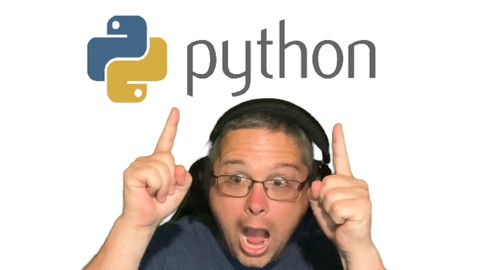
Ultimate Guide to Python for Beginners in 2023
Ultimate Guide to Python for Beginners in 2023, available at $19.99, with 90 lectures, and has 6 subscribers.
You will learn about Develop Python skills for creating basic programs and solving problems. Utilize Python's data structures and manipulate data effectively. Gain hands-on experience in creating Python applications. Understand Python functions, modules, and libraries. Master file handling and exception handling in Python. Explore object-oriented programming principles using Python. Complete projects showcasing your Python programming proficiency. Establish a strong foundation for future Python courses and tech career pursuits. Learn the foundational elements required for Data Science and Machine Learning This course is ideal for individuals who are Beginner Python developers interested in Data Science or Beginner Python developers interested in Machine Learning It is particularly useful for Beginner Python developers interested in Data Science or Beginner Python developers interested in Machine Learning.
Enroll now: Ultimate Guide to Python for Beginners in 2023
Summary
Title: Ultimate Guide to Python for Beginners in 2023
Price: $19.99
Number of Lectures: 90
Number of Published Lectures: 90
Number of Curriculum Items: 90
Number of Published Curriculum Objects: 90
Original Price: $19.99
Quality Status: approved
Status: Live
What You Will Learn
- Develop Python skills for creating basic programs and solving problems.
- Utilize Python's data structures and manipulate data effectively.
- Gain hands-on experience in creating Python applications.
- Understand Python functions, modules, and libraries.
- Master file handling and exception handling in Python.
- Explore object-oriented programming principles using Python.
- Complete projects showcasing your Python programming proficiency.
- Establish a strong foundation for future Python courses and tech career pursuits.
- Learn the foundational elements required for Data Science and Machine Learning
Who Should Attend
- Beginner Python developers interested in Data Science
- Beginner Python developers interested in Machine Learning
Target Audiences
- Beginner Python developers interested in Data Science
- Beginner Python developers interested in Machine Learning
Unlock the world of programming with “Ultimate Guide to Python for Beginners in 2023,” an engaging and beginner-friendly Udemy course designed to kickstart your journey into the exciting realm of coding. Python, renowned for its simplicity and versatility, is the ideal language for beginners, making it easier than ever to understand core programming concepts.
In this comprehensive course, you’ll embark on a structured learning path that covers the fundamental building blocks of Python. You’ll discover Python’s readable and elegant syntax, making coding a breeze, even if you have no prior programming experience.
Here’s what you’ll gain from this course:
-
Python Foundations: Start from scratch and learn the basics of Python programming, including variables, data types, operators, and input/output operations.
-
Control Structures: Explore decision-making with if statements, looping with for and while loops, and get a grasp of how to write efficient and structured code.
-
Functions and Modules: Dive into the world of functions, understanding their significance in code organization and reusability. You’ll also explore Python’s rich library of modules to extend your program’s capabilities.
-
Data Structures: Master Python’s powerful data structures like lists, tuples, dictionaries, and sets to manage and manipulate data efficiently.
-
Error Handling: Learn how to handle errors gracefully with Python’s exception handling mechanism, ensuring your programs run smoothly.
-
Object-Oriented Programming (OOP): Discover the principles of OOP, a critical concept in modern programming, and apply them to solve real-world problems.
-
File Handling: Gain the skills to read from and write to files, enabling you to work with data outside the program.
-
Project Development: Put your knowledge into practice by building exciting Python projects, applying your skills to real-world scenarios.
Throughout the course, you’ll not only grasp the theoretical foundations but also put them into action through hands-on exercises and practical examples. Whether you aim to pursue a career in software development, data science, or simply want to enhance your problem-solving abilities, this course equips you with a strong Python programming foundation.
Enroll now and join the world of coding with Python. Your journey towards becoming a proficient programmer starts here!
Course Curriculum
Chapter 1: Introduction
Lecture 1: Introduction
Chapter 2: Module 1 – Environment Setup
Lecture 1: Installing VS Code and Git
Lecture 2: Installing Miniconda
Lecture 3: Installing Jupyter Notebook and Jupyter Lab
Lecture 4: Github Repo
Chapter 3: Module 2 – Python Basics
Lecture 1: Introduction to Variables
Lecture 2: Variable Declaration, Introduction to Types, Naming Conventions
Lecture 3: Data Types – Strings
Lecture 4: Data Types – Integers
Lecture 5: Data Types – Floats
Lecture 6: Data Types – Booleans
Lecture 7: Arithmetic Operators
Lecture 8: Comparison Operators
Lecture 9: Logical Operators
Lecture 10: Basic Output
Lecture 11: Formatting Output
Lecture 12: Taking User Input
Lecture 13: Mini Projects
Chapter 4: Module 3 – Control Structures
Lecture 1: Introduction to Conditional Statements
Lecture 2: if, elif, and else Statements
Lecture 3: Combining Conditional Statements
Lecture 4: Introduction to Loops
Lecture 5: For Loop
Lecture 6: While Loop
Lecture 7: Infinite Loops
Lecture 8: Break Statement
Lecture 9: Continue Statement
Lecture 10: Pass Statement
Lecture 11: Introduction to Nested Structures
Lecture 12: Combining For and While Loops
Lecture 13: Combining Loops and Conditionals
Lecture 14: Pitfalls and Best Practices
Chapter 5: Module 4 – Data Structures
Lecture 1: Introduction to Lists
Lecture 2: Common List Operations
Lecture 3: Lists as Stacks and Queues
Lecture 4: Introduction to Tuples
Lecture 5: Tuple Operations
Lecture 6: When and Why to use Tuples
Lecture 7: Tuple Methods
Lecture 8: Introduction to Sets
Lecture 9: Set Operations
Lecture 10: Set Methods
Lecture 11: Practical Use Cases of Sets
Lecture 12: Introduction to Dictionaries
Lecture 13: Accessing Dictionary Elements
Lecture 14: Dictionary Methods
Lecture 15: Practical Use Cases for Dictionaries
Chapter 6: Module 5 – Functions and Modules
Lecture 1: Introduction to Functions
Lecture 2: Basic Syntax of Functions
Lecture 3: Arguments and Parameters
Lecture 4: Return Values
Lecture 5: Understanding Scope
Lecture 6: Local and Global Variables
Lecture 7: Best Practices for Scope
Lecture 8: Introduction to Lambda Functions
Lecture 9: Syntax and Usage of Lambda Functions
Lecture 10: Common use Cases for Lambda
Lecture 11: What are Modules?
Lecture 12: Importing Modules
Lecture 13: Common Libraries in Python
Lecture 14: Installing External Libraries
Chapter 7: Module 6 – File and Exception Handling
Lecture 1: Introduction to File Handling
Lecture 2: Reading Files
Lecture 3: Creating New Files
Lecture 4: Introduction to Writing Files
Lecture 5: Introduction to Exceptions
Lecture 6: Basic Exception Handling
Lecture 7: Multiple Exception Blocks
Lecture 8: Custom Exceptions
Lecture 9: Exceptions as Objects
Chapter 8: Module 7 – Introduction to Object-Oriented Programming
Lecture 1: Introduction to Object-Oriented Programming
Lecture 2: Real-World Analogies
Lecture 3: Using Objects
Lecture 4: Introduction to Instance and Class Variables and Methods
Lecture 5: Class Variables and Methods
Lecture 6: Instance Variables and Methods
Lecture 7: Instance and Class Variables and Methods (extended)
Lecture 8: Advanced 'init' use Cases
Lecture 9: Base and Derived Classes
Lecture 10: Introduction to Inheritance
Lecture 11: Private Attributes and Methods
Lecture 12: Getters and Setters
Lecture 13: Method Overloading
Lecture 14: Polymorphism
Chapter 9: Capstone Projects
Lecture 1: Calculator – Overview and Design
Lecture 2: Calculator – Build
Lecture 3: Contact Book – Overview and Design
Lecture 4: Contact Book – Build
Lecture 5: Banking System – Overview and Design
Lecture 6: Banking System – Build
Instructors
-
Jesse Richey
AWS x4, Python Aficionado, and AI Enthusiast
Rating Distribution
- 1 stars: 0 votes
- 2 stars: 0 votes
- 3 stars: 0 votes
- 4 stars: 0 votes
- 5 stars: 0 votes
Frequently Asked Questions
How long do I have access to the course materials?
You can view and review the lecture materials indefinitely, like an on-demand channel.
Can I take my courses with me wherever I go?
Definitely! If you have an internet connection, courses on Udemy are available on any device at any time. If you don’t have an internet connection, some instructors also let their students download course lectures. That’s up to the instructor though, so make sure you get on their good side!
You may also like
- Top 10 Content Creation Courses to Learn in December 2024
- Top 10 Game Development Courses to Learn in December 2024
- Top 10 Software Testing Courses to Learn in December 2024
- Top 10 Big Data Courses to Learn in December 2024
- Top 10 Internet Of Things Courses to Learn in December 2024
- Top 10 Quantum Computing Courses to Learn in December 2024
- Top 10 Cloud Computing Courses to Learn in December 2024
- Top 10 3d Modeling Courses to Learn in December 2024
- Top 10 Mobile App Development Courses to Learn in December 2024
- Top 10 Graphic Design Courses to Learn in December 2024
- Top 10 Videography Courses to Learn in December 2024
- Top 10 Photography Courses to Learn in December 2024
- Top 10 Language Learning Courses to Learn in December 2024
- Top 10 Product Management Courses to Learn in December 2024
- Top 10 Investing Courses to Learn in December 2024
- Top 10 Personal Finance Courses to Learn in December 2024
- Top 10 Health And Wellness Courses to Learn in December 2024
- Top 10 Chatgpt And Ai Tools Courses to Learn in December 2024
- Top 10 Virtual Reality Courses to Learn in December 2024
- Top 10 Augmented Reality Courses to Learn in December 2024






















